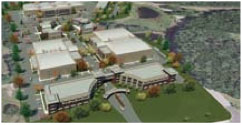By Hartley Pleshaw
Publisher’s Note: As we were going to print,an enthusiastic Mike Myer’s, MJM Development’s Managing Director tasked with constructing New England Studios in Devens, Massachusetts gave IMAGINE an important construction update, which I am including here:The studios wall panels have been built on the ground outside the footprint of the building on casting slabs.After all 120 reinforced concrete panels have been poured and cured in the forms on the casting slabs, they are being hoisted into place by a massive 250 ton crane. Each panel is 56’ high, 20’ wide, 10.5 inches thick weighing 140,000 lbs each.The hoisting began on December 6th and will continue through Christmas.
These “walls” distinguish New England Studios from most of their competitors.The Stages are specifically designed to meet the film industry’s cutting edge barometer of an NC 25 (Noise Criterion) sound rating. NC 25 is a critical element of Hollywood stages and commands higher occupancy that the converted warehouse space or pre-engineered buildings found in many other states competing for the coveted film industry business. Mike Meyers explains,“This rating is achieved by ‘massing’ – also known as thickness.”
Myer’s added, “By late next summer, a structure the size of a football field will have all sorts of cutting-edge sound and lighting equipment, cameras and computers.Then, film production crews from around the country will start gathering there to do their magic…”
Previous to this update, Hartley Pleshaw interviewed Chris Byers, New England Studios Operating and Marketing Director. Here is his report.

Aerial Views of New England studios campus full build out master plan being built now in Devens, mA. rendering by Bastien and Associates, inc. courtesy of mJm Development.
In the late-1990’s, when the author of this article worked in Ayer, Massachusetts, he would frequently drive through the then-recently closed Fort Devens, the former U.S Army base.
It was a curious, and curiously moving, site. The base was gone, but just about everything that it consisted of was still there.The military-related facilities were all intact, including the parade ground, a deserted PX, and at least some of the buildings which housed enemy P.O.W.’s during World War II. Rows upon rows of houses—suburban ranch houses, brick townhouses; entire neighborhoods, actually—sat empty as well. Other empty buildings also stood as monuments to what had been, only two years before, a vibrant community. One was a closed movie theater.
All in all, the effect was both poignant, and, I daresay, a little creepy. It was what a typical American town might look like after, say, a neutron bomb attack: perfectly intact buildings, with not a soul to be found.
Being who I was, and what my personal interests were, however, I immediately thought of another scenario. “This looks just like a movie set,” I would think to myself, with the immediately following thought:“And what a great place for one!”
Someone else felt that way, too. But that person seems on the verge of making it happen.
Chris Byers knows the area around what is now Devens, Massachusetts well. He was born and grew up in Lowell, MA, approximately 25 miles to the northeast. He attended school at Cushing Academy in Ashburnham, MA, approximately 20 miles to the northwest. And, where film is concerned, he knows the way to Hollywood, and back. He’s traveled it, literally.

chris Byers, has spearheaded the drive to create New England studios. He will serve as it Director of operations and marketing. Photo by Dan Bérubé.
Chris is the head of New England Studios, the company behind the plan to build a fully functional film studio in Devens. It’s an idea that he’s had for some time, but is now becoming a physical reality. Groundbreaking began on June 26th, 2012.
“The studio is now under construction.We are hoping for a July, 2013 completion.
“Our first phase will consist of four, 18,000 sq. ft. stages. Stage One and Two will have a connecting elephant door, as will Stages Three and Four. This means that you can open these doors, and it expands out, and doubles the space of the stages.
“We’ll have 30,000 sq. ft. of production office support space, which is hair, makeup, dressing and green rooms.
“The other 20,000 sq. ft. is production office space. In the rear of the stages, we’re going to have dimmer rooms, approximately 7500 sq. ft. a piece, for each stage.
“And then, in back of the four studios, you’re going to have a 20,000 sq.ft.mill building,which is going to consist of 7,000 sq. feet of mill space , and 13,000 sq.feet of grip and electric.”
No, Chris Byers obviously isn’t kidding about putting a full- size, fully equipped, fully functional film studio in Devens. But who’s going to use it, and when?
“You’re never going to have production companies committing a year in advance. Typically, projects get green lit in-between two and four or five months prior to them shooting.
“The projects that we’re looking at down the road really haven’t been conceived yet. What we’re really basing everything off of is the consistency of the work load that’s been here over the last eight or ten years.The other thing that we’re basing a lot off of is, I meet with all of the major studios, and I gauge their interest in shooting here, shooting in Massachusetts, and specifically, what their need is, as far as studio space.
“We have got nothing but stellar reviews from all of the majors.”
As great a job as Chris Byers and his associates have done so far, much is still beyond their control—for obvious example, the continuation of the lifeblood of film production in the Commonwealth, the Massachusetts Film Production Tax Credit.Yes, the reward for all his work may well be great, but what about the risk Chris is taking?
“Once you start fully understanding the scope of a film, and what it does to a local area, how it enhances the economy in a short period of time….think about somebody taking an $80,000,000 business, dropping it in Massachusetts, spending the money in six to eight months, and, probably realistically, putting $30,000,000 of that $80,000,000 into the local economy. Not many businesses come here and do that, or go anywhere and do that.And there could be four or five or six productions that could do that in a six month period. There could be twenty projects, there could be fifty projects that do that over a year.That’s a lot of money that goes into the local economy.
“As far as us,and the team that is putting this project together, we’ve gone over the risks and rewards for two years now.We felt that with the way the support has been in Massachusetts, the potential for films to come here,even without a tax credit, (with) the local advertising market, that there’s the potential to keep the business up and running.
“Of course, the tax credit does give us a much better opportunity, and a much better reward, but we feel that if this project pans out over the next ten years, which is what the tax credit is on the books for, we’ll have a great enough reward to minimize our risk, especially with the potential of building hundreds, if not thousands, of jobs over that period of time.”
Why Devens?“Our first thought was Lowell.That was where we first thought that this project was going to land.Then, when the project expanded out into a much larger scale, there was no area in Lowell that could fit the project; that became our biggest crux.

A 250 ton crane begins the process of positioning the sound proof walls of the future home of New England studios in Devens, mA. Each slab is 56’ high, 20’ wide and 10.5 inches thick. The process began on December 6th and is expected to be completed shortly after christmas. Photo courtesy of mJm Development, llc. / New England studios phases of construction, pouring the foundations, pouring and curing the walls and the 250-ton crane that will hoist the walls into place before they are bolted to the foundation. Photos courtesy of mJm construction.
“So, we went out where land was plentiful, and where we’re 29 miles from Boston as the crow flies.What Devens also did, without the initial thought being this, was to put us in the middle of everything. It put us in the middle from Worcester, to Lowell,to Boston. Now, if you were going from Worcester to Boston, that’s quite a trip. If you’re going from Devens to Worcester, it’s not that big of a trip. And, as I said, it’s the same going from Lowell to Boston.It’s taking the expense of Boston out of the site. And, you’re adding value, because you’re in the middle of everything now.
“The other thing that Devens offered us was enough land to grow this project into a mega-project,if the demand warrants that.
“And then, the other real selling point for Devens was the infrastructure. It has probably some of the best infrastructure in the state.
“This project is an economically-based project. Other projects tout a $550,000,000 price tag; economically, I knew that wasn’t feasible.They didn’t have the right thought pattern behind them,and they didn’t have the recipe for success.Ours is based off of economics and superiority. The design, the fabrication is superior.And, the economics of it is manageable. So,that’s what we based everything on,to be honest.”
Along with location and infrastructure, the Devens studio project would seem to have something else going for it:timing. The explosive growth of film production in Massachusetts and all of New England would seem to cry out for a major studio facility within earshot of several major cities— specifically, Boston—but, one which would also have plenty of space, while being free of urban commuting, parking and zoning hassles (to say nothing of either humongous rent or property taxes). It would also seem to demand a permanent (well,as permanent as the film business can be),fixed location, a place where local companies who service film production can find a semi-guaranteed market for their wares,and where individual New Englanders who would like a career in film production at whatever level—from directing to acting to makeup artistry—can take their degrees from Emerson, Boston University and other such places of higher (film) learning, without also having to be concerned with apartment hunting in Manhattan, or negotiating the Hollywood Freeway.
Can the Devens studio be the belt-buckle that holds the new world of New England film production together? Chris Byers obviously thinks so.
“The whole goal behind this is that the studio becomes the epicenter for the film. Engine Room, Powderhouse, Rule Camera,Talamas Sound…we’re expecting them all to have a presence up at the studio. I’ve talked to all of these people, and they’re all sort of waiting to move up there.Whether it’s a satellite, or they put their main facility there, really isn’t the issue. It’s a presence.What we’re trying to do is give all the local players opportunities to be up at the studio, because they’re the ones who have weathered the storms over the last twenty to twenty five years, however long they’ve been in business.
“Instead of bringing in a bunch of California-based companies— who,let’s face it,they can sort of be like locusts,coming in and out of every state that becomes popular—we’d like to have more of a secure base here, for a long-term relationship.
“Our goal is long-term sustainability for all the companies that come up to the studio.”
And whose idea was the Devens studio in the first place? Chris Byers himself.
“I championed the project from Day One.The view of the project from economics, rather than grand exposure—sort of ‘smoke and mirrors’—has been held all the way through, (from) the investors that I got to, and got involved in the project,to the land development guy,Mike Myers.Everybody’s been on the same page from Day One with this project.”
Key to the Devens studio project is the unique situation the community of Devens presents.After the army based closed in 1996, the land was administered by Mass Development, a semi-private development authority. It was decided that, instead of chopping up the old base and parceling out the land to adjoining towns, Devens would remain a unified entity. Its political status is still up in the air—residents can vote in the towns of Harvard and Ayer, but not for their own Devens officials—but its development as both a residential area and industrial park has proceeded apace. A new hotel ,restaurants, golf courses, a charter high school and other such businesses and institutions have emerged, as well as new and renovated residential housing. Its location, history and unique political and developmental status—excellent existing infrastructure, combined with acres of open land—make it ideal for entrepreneurs like Chris Byers.
“I’ve found everybody I’ve dealt with, from Devens and from MassDevelopment, have championed the project from Day One. I think that they were a little bit skeptical at the beginning, because there had been so many failed attempts (at films studios in Massachusetts). (But) once they found out how real the project was, they’ve been more than helpful, in every area.
“We haven’t faced many hurdles,but some of that comes from us being very prepared as well. Our group is very meticulous with paper work, due diligence and research. They just do an amazing job.When they go to MassDevelopment, they’re totally prepared.When MassDevelopment comes back to us, they seem to be as prepared as we are.The relationship has been respectful, it has been helpful, and everybody has very happy with both sides.”
While the Summer of 2013 remains the target time for the general opening of the studio, activity is already taking place, and shape. New England Studios will be co-sponsoring (along with Talamas) a series of workshops in February, 2013. (The highly respected author and production instructor Richard Cadena will be teaching at the workshops.) And active support of local film projects, from features to industrials, has already begun. New England Studios is now renting lighting and grip equipment packages out of a temporary facility in Tewksbury, Massachusetts.
Lowell native Chris Byers didn’t start out looking for a career in film; he originally wanted to be a hockey player. But, an injury put a stop to that. Meanwhile, his brother had been working in Hollywood as a director of photography. “I just wanted to see what that whole thing was about; I’d never been around it. So, I went and saw it. It was fun, but I thought that they were out of their minds, working 15-hour days. I couldn’t even imagine it!
“Three months later, I stopped playing hockey. I went down to visit my brother, and he asked me to do a show with him. I looked at my watch, and thought,‘Well, there’s nothing else going on! I’ll do this.’Then,they asked me to do another show. I ended up doing grip, electric—and I ended up doing stunts! I fell into stunts for a couple of shows; the stunt coordinator liked me, and I’d do just about anything. Nothing was too brutal, because I just got out of playing hockey! It was sort of natural.
“I naturally just sort of blended in (to film).After three or four shows, I looked around and said,‘If these guys can make a living doing this, I can own this business!’ I was cocky; that’s what you say when you’re a 24-year-old kid. So, I kept plugging away.
“I got into equipment rental when nobody was in it; I saw a lot of potential there. I started getting into a lot of the rock videos and commercials, and built a pretty decent company hop scotching equipment trucks from job to job.From there,I just learned the rest of the business from working at all of the departments, all the way up to Executive Producer.”
Meanwhile, major feature film production began to blossom in Chris’s own home town of Lowell (e.g.,THE FIGHTER, THE INVENTION OF LYING).He literally went Hollywood, but came back.And Chris Byers is glad he did.
“I think that Massachusetts is one of the best states (to do business in). Try doing business in California. They’ve been chasing business out of that state for twenty five years.
“I wish success on everybody. I don’t want anyone victimized. I wish that everybody could succeed and do well, and follow their passions and dreams. But, the reality of California is that business has been pouring out of that state for decades. It’s not a new issue. Now, it’s gotten affecting their whole economy. to the point where it’s totally “Massachusetts (is different). We’re the only ones who have the state health care system.
Hartley Pleshaw has worked in Boston-area television, film, radio, theater and journalism for the past thirty years. He has written for IMAGINE since 2006. His email address is: hartleypleshaw@gmail.com.




